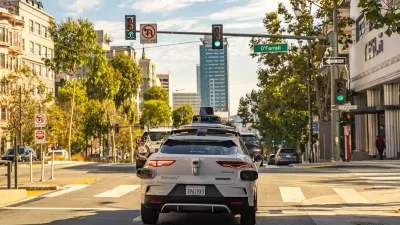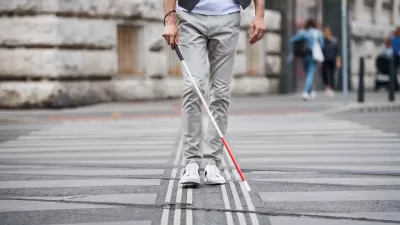Autonomous vehicle technology is no longer enjoying an uncritical reception. Skepticism, it seems, is becoming a more common response to the idea of setting robot cars free on the streets.

According to an article by Jeremy Kahn, pedestrians behavior continues to challenge researchers and engineers working on automated vehicle technology. That "burning issue" could be impacting the viability of the technology.
The message communicated by some engineers: you're crossing the street wrong. Or, as Andrew Ng puts it in the article, "Please be lawful and please be considerate."
Since an Uber self-driving car struck and killed a pedestrian in Arizona earlier this year, some safety advocates have questioned whether automated vehicles should be on the road if they can't guarantee the safety of pedestrians. Angie Schmitt's take, written shortly after Kahn's article, calls out the autonomous car industry for trying to shift blame on jaywalkers and trying to reprogram the public realm to suit the shortcomings of autonomous vehicles technology.
Kahn raises one additional interesting point, which is to say the article implies some doubt that autonomous vehicles are as viable as the technology's boosters would have the world believe. Kahn points to the struggles of Uber and Teslas as examples of the industry "losing steam." The New York Times also echoed that new doubt about the viability of self-driving technology, referencing Uber specifically in an article published yesterday.
Kahn also adds questions about other companies racing to beat everyone to the autonomous vehicle market: "Google’s Waymo has promised to launch a self-driving taxi service, starting in Phoenix, Arizona, later this year, and General Motors Co. has pledged a rival service—using a car without steering wheel or pedals—some time in 2019. But it’s unclear if either will be capable of operating outside of designated areas or without a safety driver who can take over in an emergency."
FULL STORY: To Get Ready for Robot Driving, Some Want to Reprogram Pedestrians

Alabama: Trump Terminates Settlements for Black Communities Harmed By Raw Sewage
Trump deemed the landmark civil rights agreement “illegal DEI and environmental justice policy.”

Study: Maui’s Plan to Convert Vacation Rentals to Long-Term Housing Could Cause Nearly $1 Billion Economic Loss
The plan would reduce visitor accommodation by 25% resulting in 1,900 jobs lost.

Planetizen Federal Action Tracker
A weekly monitor of how Trump’s orders and actions are impacting planners and planning in America.

Waymo Gets Permission to Map SF’s Market Street
If allowed to operate on the traffic-restricted street, Waymo’s autonomous taxis would have a leg up over ride-hailing competitors — and counter the city’s efforts to grow bike and pedestrian on the thoroughfare.

Parklet Symposium Highlights the Success of Shared Spaces
Parklets got a boost during the Covid-19 pandemic, when the concept was translated to outdoor dining programs that offered restaurants a lifeline during the shutdown.

Federal Homelessness Agency Places Entire Staff on Leave
The U.S. Interagency Council on Homelessness is the only federal agency dedicated to preventing and ending homelessness.
Urban Design for Planners 1: Software Tools
This six-course series explores essential urban design concepts using open source software and equips planners with the tools they need to participate fully in the urban design process.
Planning for Universal Design
Learn the tools for implementing Universal Design in planning regulations.
Caltrans
Smith Gee Studio
Institute for Housing and Urban Development Studies (IHS)
City of Grandview
Harvard GSD Executive Education
Toledo-Lucas County Plan Commissions
Salt Lake City
NYU Wagner Graduate School of Public Service





























